Rob Osterman's Blog, page 8
October 5, 2012
October 2, 2012
Banned Book Week: My Love Hate Relationship
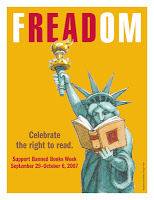 This week is Banned Book Week.
This week is Banned Book Week. This is where we stop and celebrate that we can read books that people want to ban for a variety of reasons. We can ride a raft down the Mississippi with Huck Finn even though putting such a bright glaring light on the evils of racism and post-slavery Southern States make some people uncomfortable. We can ride the Hogwarts Express and learn about the power of the individual who cares even though some people don't like that there are witches and magic. We can come of age with a nervous teenager and What [Her] Mother Doesn't Know even though many mothers would rather we not know.
This is actually a bit of a big deal.
We forget, too easily, that there are parts of the world where the government, or the religious leaders, can forbid their people from having access to words that they don't want them to read. They can deny that printed books be sold, that internet sites be accessible. They can lock down Twitter on a whim and can make Facebook posts just vanish.
Even in our own history, not too long ago, having the "wrong" book in your house was a way to get yourself listed a Communist, be blacklisted from your profession and have your life ruined. We did not tolerate different very well, and most Americans worried more about keeping food on the table, and gas tanks full of fuel then they did making a fuss about their Right To Read. Thankfully we outgrew that phase.
But I'm always a little hesitant about banned book week as well. And as the author of a banned book, I think I have the right to comment.
Fantasti*Con was added to our district library for all High Schools. There's a copy in each one of them now for check out by students. It's very cool to see the little author sticker stuck on the spine. It is, however, not stocked in our middle schools.
It's Banned.
The reason, to me, is completely logical. The book has a pretty intense scene it that will probably freak out a kid who's only 11 making their way through it. I think it's completely readable by a bright Eighth Grader, but I'm not sure they're really mature enough for it.
And that gets me to what I somewhat dislike about this week.
I'm not really someone who can say that their book is banned. I'd like to because, hey, all the cool authors have. Huxley, Lee, Rushdie (who, by the way, gave a great interview on the Daily Show), and others all have banned books. And they were banned by governments, political parties and religious fundamentalists. They were banned because you, as an adult, were not supposed to read them.
Those are Banned books.
I just saw The Hunger Games on a list of banned books because it's too adult for children to read and parents had concerns with it's level of violence.
Now we can agree or disagree on at what age someone should or should not read about ritual execution of other children. There are lots of places to put that particular pin on the time line. But saying "This book is for adults only" is NOT banning it. It's saying "hey, this book really is for adults."
Also on the list? Gossip Girl. Why was it banned? Because people felt it provided poor role models for teenage girls. Okay. But did anyone tell an adult they couldn't read it for some reason? Am I, as an adult, forbidden from buying it or checking it out of the local library?
A quick visit to the ALA page shows Hunger Games as #3 on the challenged list, and Gossip Girl at #9. They're challenged more classics like To Kill a Mockingbird (#10) and Huck Finn (not ranked in the top 10). Is it, perhaps, that these books are being challenged because they're not being treated in an age appropriate way? My gut says that's far more the case, and once a few people complain, nothing moves sales like being a "banned book".
So if we're going to celebrate banned books, let's celebrate books that were banned for their honesty, for their vision or for challenging us to see the world around us a little differently. Banned book week is for our Right to Read. It's for our right to see what a mess we've made of ourselves. It's for being challenged, titillated and grossed out. It's for every Adult's right to choose.
It's not for people to complain that their 13 year old can't get 50 Shades of Grey in their high school library.
Published on October 02, 2012 05:53
September 28, 2012
FFV: 5 Piano Guys, 1 piano
Who needs a full orchestra when you have these guys?

Published on September 28, 2012 18:15
September 25, 2012
Write what you know
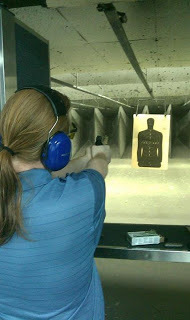 Write what you know.
Write what you know.This is the mantra of writers. I sometimes think that the code should be "If you don't know it, don't write it." One of my biggest pet peeves is not so much when someone writes something that's just a little off but when it propagates significant misinformation on a topic.
For example, in the 18th century, women wore pouches under their skirts called "pockets". It was a relatively new invention to attach these directly to garments as we know them now. Back then the pockets were separated from the garments and worn on a separate band about the waist and under their skirts.
Despite this fact, over and over, at re-enactments, women will walk around with their pockets on the outside of their skirts and show off the lovely embroidery on there. They'll talk about the hours women would spend on needle work to adorn the pockets (they did) and the pride they would put into making them (they had it) and how women would be happy to show them off (they did not). To suggest they did is a bit like talking about how women today would show off their lacy bras to anyone and everyone because they were so proud to wear such cute underthings.
Over in Mind the Thorns, Regan found herself faced with choices as to how to deal with a band of vampire hunters coming to kill her. As of Thursday morning, the day the poll closed, the vote was heavily favoring the use of a sword. Then, over the single day, the entire thing shifted, with several votes in a row deciding that she would pick up a pistol instead. I wrote the addendum and stared at it.
What was it like to shoot a gun?
I'd fired a musket before for re-enacting. It's a loud beast but when there's no ball loaded it doesn't do much in the way of kick. I've been told the kick is fairly substantial and my physics background supports that. An 18th Century musket is, after all, a .75 caliber firearm. By most classifications today, that rates as an anti-tank weapon.
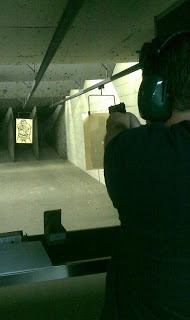 So I hopped on Steam chat, found my friend Derek and within a few minutes arranged to meet him the next morning at the gun range. There we talked about the guns Regan was likely to fire, I got a crash course in how the guns were set up, and what "features" each offered, and then we shredded some paper targets.
So I hopped on Steam chat, found my friend Derek and within a few minutes arranged to meet him the next morning at the gun range. There we talked about the guns Regan was likely to fire, I got a crash course in how the guns were set up, and what "features" each offered, and then we shredded some paper targets.I mostly fired the 9mm that he had brought. I have to say that the gun was remarkably easy to use and fit very comfortably into the hand. Just like the airsoft pistol I have, there was a button under the thumb that releases the magazine for quick reloading. It had surprisingly little kick to it and I was able to fire it fairly well simply resting it on my off hand rather than really bracing it hard.
The second he handed me was a small holdout pistol, a .38 Ruger. This is the pistol that he carries as part of his CCW and that was what it was designed for. Unlike the 9mm it had no hammer to pull back and thus had less things to catch on when you pulled it from a purse or pocket.
This gun scared me. Every shot felt like it was going to leap out of my hands. We loaded 5 rounds in the magazine and I was glad to put it down.
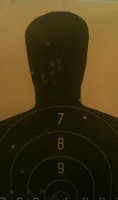 In Chapter 7 Regan really gets a chance to let loose with the pistol:
In Chapter 7 Regan really gets a chance to let loose with the pistol:Planting her foot on the ground outside again she popped out into night and braced her arm along the side of the SUV. The cool clean air struck her as a stark contrast to the acid smell inside the SUV. She took aim at a dark spot she thought was one of the hunters and snapped the trigger back.
She felt the shot far more than she saw or heard it. She already had a rising ringing in her ears from the crack of Jeremiah’s assault rifle, and the steady destruction of the SUV around her. But it was the wall of force that slammed against her chest that she truly took notice of. She blinked and tried to line up another shot. She pulled back and again the wall of sound washed back over her as the gun fired.
It was an incredibly fun exercise as a writer and I think one that too many of us don't value in our craft. It's all well and good to have mental pictures, or rough ideas of what something is or feels like. It's a completely different thing to get out there and experience it, and then write about that experience.
Lastly I want to recommend the movie: Happy Together staring Patrick Demsey and Helen Slater. In short Demsey's character of Chris wants to become a writer and write the next great American Novel. Only he's never known love, he's never known heart break, and he's never known life. His writing mentor comments on this early in the movie, and again when appropriate for a Romantic Comedy (because you know there's going to be heart break at some point).
Published on September 25, 2012 05:00
September 21, 2012
FFV: Bad Horse Ponies
After signing this to every Dr. Horrible we could find at Dragon Con, and then once to Alan Tudeyk, this tune has a very special place in my heart.
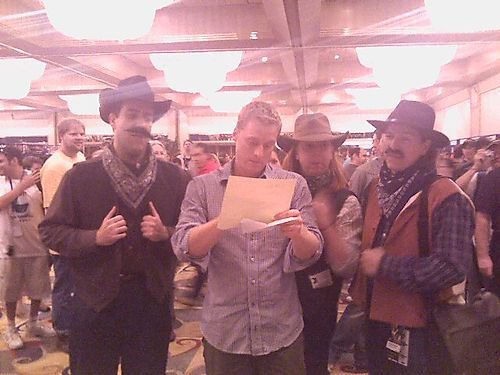


Published on September 21, 2012 05:00
September 18, 2012
Casting for Stories
 One of the things that always struck me as very sophomoric with writing was the "Cast List" for a piece of fan fiction or story. If a writer wants the reader to conjure up a specific mental image for a character, then it's their job to provide that image in the prose itself. And to be honest even that task is not easy.
One of the things that always struck me as very sophomoric with writing was the "Cast List" for a piece of fan fiction or story. If a writer wants the reader to conjure up a specific mental image for a character, then it's their job to provide that image in the prose itself. And to be honest even that task is not easy. In writing FantastiCon, I had an exchange in the first chapter that provided a very indepth description of a walk on character. Allison was at the desk of her apartment complex with a random, unnamed other woman. I then went through everything the random girl was wearing and contrasted it with Allison. Then Allison walks off and we never see random girl again.
This drove my wife nuts. She got a full paragraph treatment to a character she never sees again, one that doesn't even get a name. So why did I do it?
In the end the extended visuals got cut as unnecessary and I had to find another excuse to say "here's what Allison looks like." Fortunately I was able to do just that in the next chapter as her friend comes over and tallies up her crimes against fashion. The mission was still accomplished but it did not require me to go through and create a character just for comparison.
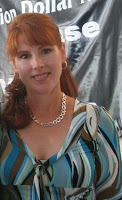 So I understand the dilemma in writing to get that idea across and not lose the flow of the prose itself. There is a certain attraction to just say "hey, the part of Regan is played by Pat Tallman, here's her picture!" I'm not saying it's good writing, but it's a clear temptation.
So I understand the dilemma in writing to get that idea across and not lose the flow of the prose itself. There is a certain attraction to just say "hey, the part of Regan is played by Pat Tallman, here's her picture!" I'm not saying it's good writing, but it's a clear temptation.Speaking of, yes, the part of Regan over on Mind the Thorns is played by Pat Tallman. Let me explain why that matters to anyone, especially me.
When writing about a character there are lots of physical descriptors that come into play. You want the audience to know what the character looks like without resorting to a "played by". The easiest way to do that is to provide a reference image for your files and use that to describe the character as you write. Another way is to create a file where you drop all of your character descriptions as they come up in the prose so you can go back over them. And lastly you can write up character biographies and descriptions before you start writing and then play to them.
 The risk of the latter is that I've found myself changing those bios usually within the first two thousand words of the prose. For some reason a character just needs a different skill set, or I realize that I've got too many red-heads on camera at once (you get one, unless they're blood relations). In Mind the Thorns the character of Emma started out with super long silver hair. Then the more I worked her into chapter 4 the more she morphed more into a short no-nonsense pixie cut in black. It just worked better. Now I use Nicole DeBoers as my visual when I'm writing. Of course that's about to change a little too.
The risk of the latter is that I've found myself changing those bios usually within the first two thousand words of the prose. For some reason a character just needs a different skill set, or I realize that I've got too many red-heads on camera at once (you get one, unless they're blood relations). In Mind the Thorns the character of Emma started out with super long silver hair. Then the more I worked her into chapter 4 the more she morphed more into a short no-nonsense pixie cut in black. It just worked better. Now I use Nicole DeBoers as my visual when I'm writing. Of course that's about to change a little too.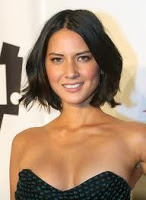 We've been watching Newsroom and the character of Sloan Sabbith played by Olivia Munn has really caught my eye as a really cool character and a very attractive woman. So for a little while I'm not sure who Emma looks more like, Sloan or Ezri. I'll have to decide soon because at present either woman could play the part.
We've been watching Newsroom and the character of Sloan Sabbith played by Olivia Munn has really caught my eye as a really cool character and a very attractive woman. So for a little while I'm not sure who Emma looks more like, Sloan or Ezri. I'll have to decide soon because at present either woman could play the part.But what I think is the 'best practice' is to go ahead and collect the reference image but keep it in your private files. It's for your internal notes and consistancy more than it's for your readers. It should go in the same place you put your interview notes, your scene photos and your room layouts.
Now I admit that since I started posting Mind the Thorns over on Wattpad, there's been a bit of a drive to include more photographs and to have a "cast list" over in the margin. This has made me feel like I should have, well, a cast list. I really do hate leaving those areas open. What I'm not sure I'll do is to actually post the "played by" on the website or anything. There is a temptation to do so on the "Previously" page where I have the story summaries, but I'm not sure I want to go there, yet.
It has been a fun exercise, I will say, and for other stories, like Forget Me Never it forced me to stop and say "what does she look like?" I confess too it's been a good excuse to break out the Twitter and try to get some buzz going, which is not a bad thing.
Published on September 18, 2012 05:00
September 14, 2012
September 11, 2012
Hey Don Draper: Stop lying to my kid!
 So it all started when Xander was told that he had to go to the store to buy new shoes. He was barely fitting into his current light up Toy Story shoes and his toes were hanging over the edge of his sandals. He was ready for a bigger size.
So it all started when Xander was told that he had to go to the store to buy new shoes. He was barely fitting into his current light up Toy Story shoes and his toes were hanging over the edge of his sandals. He was ready for a bigger size."Yes! We need to get Skechers because they make you run super fast and fly and be a superhero!"
I blinked.
"Your shoes make you a super hero?"
"Yeah! It's so cool you can fly and run super fast and you are Total. Super. HERO!"
Skechers is a particular brand of tennis shoes which purchases large swatches of ad time during children's programming on Cartoon network, Nick, Nick Jr, etc.
So we sat down and the conversation went like this:
"Who told you that those shoes make you turn into a super hero?" I asked calmly and conversationally.
He was quick to point a finger. "I saw it on TV."
Now, playing the "Everything on TV is a lie" card is dicey so I took a page from a blogger I've followed, well not a blogger but a commentor and went a different way. "And who do you think put it on TV?"
"Idunno." It's amazing how so many words can come out as two mashed up syllables.
"Well," I said with a shrug, "the stuff that's not part of the show is there to convince you buy things. They get paid to come up with ways to make you think that stuff's so cool you need to buy it."
"So they lie to you?" He was looking a little distrubed.
I shook my head. "Not exactly, but they don't always tell you everything. Let's make a deal: Do you really want Skechers?"
He nodded his head as though his goal was to nod it clean off into his lap.
"Because they make you a superhero?"
Nodnodnodnod.
"Well, what does it mean if you put the shoes on and you don't become a super hero?"
He paused, thinking, knowing that he had to know the answer. After a few moments: "Idunno."
"Well that might mean they're broken. Would you want us to buy you broken shoes?"
"Oh no. I want shoes that work!"
So we set out for the store. Straight to the Kids' Shoes, then over to Kids' Clothes to buy socks (we wore sandals foolishly) and then back to Shoes. We found a pair of Sketchers and on they went.
"So, can you fly?"
He pushed up onto his toes a few times, testing gravity and found that he was still very squarely rooted to earth.
"How about super speed?"
He took a few steps forward and back. "No, I think I'm just a little boy."
I was distressed. Surely these shoes would imbue special powers. I encouraged him to come next to me. "Here try to pick me up. Maybe you got super strength."
He did wrap his arms around my knees and lift with all he had. I, too, remained earth bound.
"What do you think? Do you still want Skechers?"
"They hurt my feet. I don't like these shoes."
On the walk out we chatted with the woman at the register. I asked Xander what he thought about Skechers making you a super hero.
"No, they don't. People just say that on TV so you buy them. I like the shoes I got. They feel good on my feet and they have Superman on them."
"Do they make you feel like Superman?"
"Daaaaaaaad... they're ~just~ shoes."
You know what, Mr. Draper. Keep selling crap to my kid.
He's on to you.
Published on September 11, 2012 05:00
September 7, 2012
September 4, 2012
Save the Pearls: Destroying Eden with Self Publishing
Let me tell you about a proposed book someone had.
It takes place on another planet. There, a great ecological event has made most of the planet uninhabitable. It is especially dangerous to one of the three principle races. Where the Croa's can live in the exposed environment for a few hours, the Wie succumb to a form of skin cancer and die within minutes. Because they are so fragile, the Wie have become a minority, prized for their rarity but seen mostly as toys, or dolls, or things to keep as possessions. They are not seen as worthy of the respect shown even the lowest Croa. In fact they are so admonished that the Wie will hide who they are, wearing long concealing gowns, and hiding their forms so that the Croa are not reminded that useless sub-creatures are among them.
It is against this back drop that a Wie girl dreams of a better life. She knows that her chances of survival are minimal. If she cannot marry a Croa, she will be relegated to a short life as a trophy piece. What can she do? The story of her struggle against prejudice, against nature and the ghosts of the past. She must deal with those who discount her because of her racial status. She must prove herself and endure.
That book, I think, has a lot of potential.
That book, however, is not Save the Pearls: Finding Eden.
If you're not familiar with the train wreck that is "Save the Pearls" let me bring you up to speed.
Save the Pearls is a YA SciFi/ Speculative fiction novel, self published by Victoria Foyt. Ms. Foyt is not a newcomer to the writing, boasting several film credits on her various biographies. She is not a newcomer to the world of fiction and even has access to the Huffington Post as a means of promotion.
In StP, whites are the minority due to extreme solar radiation that killed most of them off as the human race scrambled to retreat underground for survival. Blacks are the majority and a brutal one at that, many of them seeking to kill all the whites and hold the earth for themselves. It is all intended to be a "flipping racism on its head" story and one that involves "seeing beyond skin color" by casting the victim of extreme racism to be a pretty blonde white girl.
Needless to say, it fails.
What's interesting to me, however, is that the book has gotten some good feedback from people who have read it cover to cover. Most of the negative reviews seem to be from people who read into chapter 4 and then stopped. Most recently Weird Tales planned to publish the first chapter as a teaser. The owner/editor had read the book and at first thought it was a compelling piece that examined racism in a different light. He pointed out that the key to understanding it was to understand irony. Within hours WT was slammed with negative comments, boycotts and resignations.
A look at the Amazon.Com page shows that Ms. Foyt has layered on the positive reviews her work has gotten through other media, possibly in an attempt to push the actual user reviews down, and possibly just to get some positive reviews onto the page. In addition she has gone to amazing lengths to defend her book as non-racist. Most people, it seems, including me, have read the first four chapters and then put it down. The African Americans featured there are portrayed in a horrible light, and I have to agree that "coals" is not a positive name for them. Perhaps she should have considered Obsidian as a name, or just "Obs" if that was too much of a mouthful. I think she could have spared herself some of the accusations even using the name "Flints".
But this gets me to the point I was going for: Self Publishing is partly to blame.
Ms. Foyt, clearly, did not vet her book enough before investing in taking it to press. The more I read reasonable people trying to defend it, the more I think maybe she had the starts of something viable, but because of wretched poor execution she utterly failed to connect. In fact she totally missed the point. A good editor might have seen this book and said "okay, there's a great ironic story here, but you gotta rename the races, cut some of these negative stereotypes, and lose the black-face unless you totally change the role it plays in the story. Do that and you've got winner."
But no one did. And if they did try to, it's just so much easier for Foyt to ignore them and go her own "creative" way. One of the great hallmarks of self-publishing that I see touted over and over is that the author retains complete control. They get to pick the cover, they get to pick the chapter formatting, they get to keep every story intact. But that also means that they keep all of the responsibility when the project goes off the rails.
And unlike a lot of self publishing authors starting out, Foyt had money to throw at this. She had a short video produced to help promote the book. It featured white girl in black face, cutting back and forth between her black and white personas as she made a desperate plea for someone to love her and marry her and spare her life. Even a minor publishing house would have said "wait, we can't have our name attached to this." But a producer who makes money on self publishing authors has no reason to be a voice of reason, and an actress trying to get paid does not either.
Then when everything did go off the rails, there was no one to tell her to sit down and stop before she made it worse, which is all Foyt seems to be focused on. The firestorm with Weird Tales seems to come from her effort to get a reputable outset for Sci Fi/ Speculative fiction to come into her corner. According to their blog "Marvin was approached by Victoria Foyt, and was asked to review her novel. He was told that she was being slammed online by people who had not read it."
She was reacting to the bullies of the Internet by looking for anyone and everyone to protect her.
And at this point a traditional publisher would have sat her down, told her to shut up, and let the storm run its course before anyone else got pulled into the vortex of destruction. They would have given her a script to read on the Today Show, sent her on to look contrite and then locked her away before she ruined the careers of anyone else.
But, again, she had none of that help. She went it alone and she paid for it, both by creating a work that lacked any kind of racial sensitivity, but also attempting, fruitlessly, to defend it.
Foyt's reputation is more or less a wash now. Weird Tales is going to be paying for this for a while. None of the creative participants in this came out the least bit ahead.
Does anyone? Yes.
The people who took Foyt's money to publish and promote work. Every copy she had printed and mailed out for review, they made money. The producers of her racist promotional video made money, as did whoever did the make up for it, I'm sure. Everyone around her profited on her mistaken belief that she was going to revolutionize the discussion of race in the modern era.
She kept creative control. They kept her money.

It takes place on another planet. There, a great ecological event has made most of the planet uninhabitable. It is especially dangerous to one of the three principle races. Where the Croa's can live in the exposed environment for a few hours, the Wie succumb to a form of skin cancer and die within minutes. Because they are so fragile, the Wie have become a minority, prized for their rarity but seen mostly as toys, or dolls, or things to keep as possessions. They are not seen as worthy of the respect shown even the lowest Croa. In fact they are so admonished that the Wie will hide who they are, wearing long concealing gowns, and hiding their forms so that the Croa are not reminded that useless sub-creatures are among them.
It is against this back drop that a Wie girl dreams of a better life. She knows that her chances of survival are minimal. If she cannot marry a Croa, she will be relegated to a short life as a trophy piece. What can she do? The story of her struggle against prejudice, against nature and the ghosts of the past. She must deal with those who discount her because of her racial status. She must prove herself and endure.
That book, I think, has a lot of potential.
That book, however, is not Save the Pearls: Finding Eden.
If you're not familiar with the train wreck that is "Save the Pearls" let me bring you up to speed.
Save the Pearls is a YA SciFi/ Speculative fiction novel, self published by Victoria Foyt. Ms. Foyt is not a newcomer to the writing, boasting several film credits on her various biographies. She is not a newcomer to the world of fiction and even has access to the Huffington Post as a means of promotion.
In StP, whites are the minority due to extreme solar radiation that killed most of them off as the human race scrambled to retreat underground for survival. Blacks are the majority and a brutal one at that, many of them seeking to kill all the whites and hold the earth for themselves. It is all intended to be a "flipping racism on its head" story and one that involves "seeing beyond skin color" by casting the victim of extreme racism to be a pretty blonde white girl.
Needless to say, it fails.
What's interesting to me, however, is that the book has gotten some good feedback from people who have read it cover to cover. Most of the negative reviews seem to be from people who read into chapter 4 and then stopped. Most recently Weird Tales planned to publish the first chapter as a teaser. The owner/editor had read the book and at first thought it was a compelling piece that examined racism in a different light. He pointed out that the key to understanding it was to understand irony. Within hours WT was slammed with negative comments, boycotts and resignations.
A look at the Amazon.Com page shows that Ms. Foyt has layered on the positive reviews her work has gotten through other media, possibly in an attempt to push the actual user reviews down, and possibly just to get some positive reviews onto the page. In addition she has gone to amazing lengths to defend her book as non-racist. Most people, it seems, including me, have read the first four chapters and then put it down. The African Americans featured there are portrayed in a horrible light, and I have to agree that "coals" is not a positive name for them. Perhaps she should have considered Obsidian as a name, or just "Obs" if that was too much of a mouthful. I think she could have spared herself some of the accusations even using the name "Flints".
But this gets me to the point I was going for: Self Publishing is partly to blame.
Ms. Foyt, clearly, did not vet her book enough before investing in taking it to press. The more I read reasonable people trying to defend it, the more I think maybe she had the starts of something viable, but because of wretched poor execution she utterly failed to connect. In fact she totally missed the point. A good editor might have seen this book and said "okay, there's a great ironic story here, but you gotta rename the races, cut some of these negative stereotypes, and lose the black-face unless you totally change the role it plays in the story. Do that and you've got winner."
But no one did. And if they did try to, it's just so much easier for Foyt to ignore them and go her own "creative" way. One of the great hallmarks of self-publishing that I see touted over and over is that the author retains complete control. They get to pick the cover, they get to pick the chapter formatting, they get to keep every story intact. But that also means that they keep all of the responsibility when the project goes off the rails.
And unlike a lot of self publishing authors starting out, Foyt had money to throw at this. She had a short video produced to help promote the book. It featured white girl in black face, cutting back and forth between her black and white personas as she made a desperate plea for someone to love her and marry her and spare her life. Even a minor publishing house would have said "wait, we can't have our name attached to this." But a producer who makes money on self publishing authors has no reason to be a voice of reason, and an actress trying to get paid does not either.
Then when everything did go off the rails, there was no one to tell her to sit down and stop before she made it worse, which is all Foyt seems to be focused on. The firestorm with Weird Tales seems to come from her effort to get a reputable outset for Sci Fi/ Speculative fiction to come into her corner. According to their blog "Marvin was approached by Victoria Foyt, and was asked to review her novel. He was told that she was being slammed online by people who had not read it."
She was reacting to the bullies of the Internet by looking for anyone and everyone to protect her.
And at this point a traditional publisher would have sat her down, told her to shut up, and let the storm run its course before anyone else got pulled into the vortex of destruction. They would have given her a script to read on the Today Show, sent her on to look contrite and then locked her away before she ruined the careers of anyone else.
But, again, she had none of that help. She went it alone and she paid for it, both by creating a work that lacked any kind of racial sensitivity, but also attempting, fruitlessly, to defend it.
Foyt's reputation is more or less a wash now. Weird Tales is going to be paying for this for a while. None of the creative participants in this came out the least bit ahead.
Does anyone? Yes.
The people who took Foyt's money to publish and promote work. Every copy she had printed and mailed out for review, they made money. The producers of her racist promotional video made money, as did whoever did the make up for it, I'm sure. Everyone around her profited on her mistaken belief that she was going to revolutionize the discussion of race in the modern era.
She kept creative control. They kept her money.
Published on September 04, 2012 05:00



